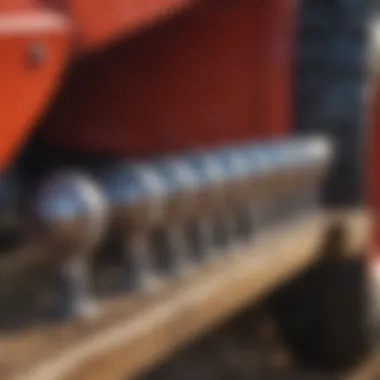Finding Quality Bolts and Batteries for Agriculture


Intro
In the world of agriculture, the tools and components that farmers depend on are more than just simple machines. They are integral to the efficiency and effectiveness of farming practices. Among the most crucial items in this field are bolts and batteries. Farmers must have access to quality bolts to ensure that their machinery operates safely and effectively. Similarly, reliable batteries are essential to power equipment that can significantly enhance productivity.
This guide aims to equip agricultural enthusiasts with the knowledge necessary to find high-quality bolts and batteries. Understanding local purchasing options, assessing product quality, and considering eco-sustainability are pivotal in this process. Highlighting these aspects will empower farmers to make informed choices that ultimately lead to greater efficiency and sustainability in their operations.
Latest Trends in Agriculture
Overview of Current Trends
Modern agricultural practices are evolving rapidly, driven by technological advancements and changing environmental concerns. Farmers today are increasingly focused on sourcing durable components, including bolts and batteries, that can withstand demanding conditions. The rise of precision agriculture often necessitates specialized equipment, raising the bar for component quality.
Impact of Technology on Farming Practices
Technology has become a cornerstone of contemporary farming. From drones to automated machinery, advancements require that every component, including bolts and batteries, meet high standards. For instance, smart farming solutions often require batteries that can support efficient energy consumption and durability under varying climatic conditions. Furthermore, the integration of technology promotes more sustainable practices and aids in reducing waste, thus emphasizing the importance of quality components in agricultural equipment.
Sustainable Practices: Towards a Greener Future
Importance of Sustainability in Agriculture
Sustainability is no longer a niche topic in the agricultural sector—it is a necessity. Farmers are more aware of their impact on the environment, leading to a shift towards practices that ensure not only productivity but also conservation of resources. When selecting bolts and batteries, agriculturalists should consider not only the functionalities but also the sustainability of sourcing methods and production processes.
Methods for Sustainable Farming
Several methods exist for promoting sustainability in agriculture. These may include:
- Crop rotation to maintain soil health.
- Integrated Pest Management (IPM) to minimize chemical use.
- Water conservation techniques to improve efficiency.
Moreover, opting for eco-friendly batteries, such as those made from recyclable materials, can further enhance sustainable practices in farming operations.
Gardening Techniques and Tips
Essential Gardening Tools and Equipment
Gardening, a crucial aspect of many agricultural practices, also requires specific tools and components. Just as with larger farming equipment, high-quality bolts are essential for maintaining the integrity of gardening tools. Effective batteries are equally important for powering devices such as tillers and irrigation systems. Investing in durable equipment not only improves efficiency but also minimizes the risk of replacement, thus saving costs over time.
Seasonal Gardening Practices
Adapting gardening practices to seasonal changes is vital for success. Different times of the year may require various tools and equipment all reliant on quality components. It is important to evaluate equipment regularly to ensure that bolts are tight, and batteries are fully functioning to cope with the demands of each season.
"Investing in quality components not only improves agricultural efficiency but enhances overall sustainability."
Organizations often provide resources for sourcing high-quality bolts and batteries. For instance, local suppliers often offer tailored advice based on regional conditions, helping farmers make informed decisions.
This guide has thus opened a window into the important aspects of finding and selecting bolts and batteries in the agricultural sphere. Each aspect discussed emphasizes the necessity of quality, compatibility, and sustainability in farming practices.
Understanding the Importance of Bolts in Agriculture
Bolts are fundamental components in the infrastructure of agricultural machinery. They are necessary for assembling and securing various parts, ensuring that machines function effectively. A damaged or low-quality bolt can lead to failures in equipment, which might result in delayed work and increased costs. Due to the demanding nature of agricultural operations, selecting the right bolts is crucial for maintaining optimal productivity.
When dealing with heavy machinery, bolts serve as key connectors, holding critical parts together under substantial stress. Strong and reliable bolts minimize the risk of mechanical failure, which can affect performance and safety. Without quality bolts, machinery can break down, leading to interruptions, which is often costly in the agricultural context.
"Quality bolts do not just hold machines together, they hold the livelihood of farmers."
Moreover, using the right type of bolt can improve the durability of equipment. It contributes to the overall efficiency of operations, fostering long-term sustainability in farming practices. Selecting quality bolts ensures farmers can rely on their equipment, which is vital for achieving consistent results and maximizing yield.
In summary, understanding bolts and their importance is not just a matter of functionality; it is about making informed decisions that impact the broader agricultural ecosystem.
The Role of Bolts in Farm Machinery
Bolts play an essential role in farm machinery, serving multiple functions that directly affect performance and reliability. They help in connecting engine components, securing attachments, and maintaining the structural integrity of various agricultural tools and machinery. When properly installed, bolts facilitate smooth operation, allowing machinery to perform at peak efficiency.
Specifically, bolts counteract different forces acting on machinery, such as vibrations, torque, and tension. This makes it important for farmers to use bolts that can withstand these factors. For example, in equipment like tractors or combine harvesters, the location of bolts affects how much stress they endure. High tensions in critical areas require stronger bolting solutions.


Furthermore, the design of bolts is tailored to meet specific requirements of agricultural machinery. Bolts are made using various materials to enhance strength, resistance to corrosion, and longevity. This detail is paramount, as agricultural environments often expose machinery to harsh elements.
Types of Bolts Commonly Used in Agriculture
Understanding the types of bolts commonly used in agriculture is essential for ensuring the right application in different farm equipment. Common types include:
- Hex Bolt: Known for its hexagonal head, it is often used for heavy machinery connections.
- Carriage Bolt: Recognized for its rounded head, it is frequently found in wooden applications or where a smooth finish is required.
- Lag Bolt: Ideal for heavy-duty wooden structures, such as farm buildings or silos.
- Shoulder Bolt: It provides a shoulder area to resist wear and is used in pivot points.
- U-Bolt: Best for securing pipes or other round objects, as it holds them firmly in place.
Each of these bolt types serves a specific purpose and selecting the wrong kind may lead to equipment failure or safety hazards.
Selecting the Right Bolt for Specific Applications
When it comes to farming, selecting the right bolt for specific applications cannot be overstated. Several factors must be considered:
- Load Requirements: Understand the weight and stress the equipment will endure.
- Material Compatibility: Ensure the bolt material matches the type of equipment to prevent corrosion.
- Environmental Factors: Consider weather influences, such as moisture and temperature extremes.
- Length and Diameter: Selecting the correct size is critical for proper fastening and maintaining joint integrity.
- Thread Type: Choosing between coarse and fine threads based on the application can influence holding power.
Overview of Agricultural Batteries
Agricultural batteries play a critical role in modern farming practices. Farmers rely on various machinery and equipment that require reliable power sources. Understanding the different types of batteries, their maintenance needs, and emerging technologies can significantly enhance agricultural productivity. Farming today demands efficiency, and quality batteries help in achieving that.
Types of Batteries Used in Agriculture
In agriculture, several types of batteries are commonly used. Each type has distinct characteristics suited for different applications.
- Lead-Acid Batteries: These are widely used due to their cost-effectiveness and reliability. They are often used in tractors and larger equipment where weight is not a significant issue.
- Lithium-Ion Batteries: Known for their longer life span and lighter weight, these batteries are increasingly popular for modern, high-tech farming equipment.
- Nickel-Cadmium Batteries: Although less common, these batteries are used in specific applications, such as portable equipment where temperature variations may affect performance.
Each battery type has its advantages and disadvantages. It is vital for farmers to select a battery that fits the specific demands of their equipment.
The Importance of Battery Maintenance
Battery maintenance is paramount to ensure the longevity and performance of agricultural batteries. Neglect can lead to decreased efficiency and premature failure.
Key maintenance practices include:
- Regular Inspection: Farmers should inspect batteries for corrosion, leaks, or any physical damage. This helps in identifying potential issues early.
- Cleaning Terminals: Keeping terminals clean is essential for ensuring good electrical connections. Dirt and corrosion can hinder performance.
- Checking Water Levels: For lead-acid batteries, maintaining the proper water level is crucial. Water loss can lead to battery damage.
By implementing these practices, farmers can extend the life of their batteries and avoid costly replacements.
Innovations in Agricultural Battery Technology
Advancements in agricultural battery technology are continuously emerging, offering numerous benefits. Innovations such as higher energy density batteries allow for longer operation times and reduced weight.
Some significant innovations include:
- Smart Batteries: Integrated with sensors and Bluetooth technology, these batteries provide real-time data about their health and charge status, assisting farmers in monitoring performance.
- Solid-State Batteries: These batteries are still in development but promise greater safety and efficiency compared to conventional batteries.
- Recycling Technologies: New techniques for recycling agricultural batteries are emerging, reducing environmental impact and recovery costs.
Understanding these innovations can help farmers make informed decisions, optimizing their agricultural operations.
Where to Find Bolts and Batteries
In the context of agriculture, sourcing the right bolts and batteries can significantly influence the efficiency of daily operations. The machinery used in farming relies heavily on these components for seamless performance. Therefore, finding dependable sources that provide high-quality materials is essential.
Availability is one factor to consider when locating suppliers. Local hardware stores, specialized agricultural suppliers, and online retailers each offer distinct benefits and potential drawbacks. Emphasizing solid connections with reliable suppliers can make all the difference.
Local Hardware Stores: Pros and Cons
Local hardware stores can be a convenient option for acquiring bolts and batteries. Many farmers appreciate the proximity of these shops. The immediate access allows for quick purchases without the need for shipping delays. However, the selection may not be comprehensive.
Pros:
- Convenience of location – Easy access can save time and effort.
- Immediate availability – No wait time for shipping.
- Support for local businesses – Encourages community growth.
Cons:


- Limited selection – Often lacks specialized sizes and designs needed for agricultural machinery.
- Potentially higher prices – Small businesses may not compete with larger suppliers on pricing.
- Knowledge gaps – Staff may not have extensive knowledge about agricultural applications.
Specialized Agricultural Suppliers
These suppliers focus on agricultural needs, providing a tailored selection of bolts and batteries specifically for farming equipment. They usually have a deeper understanding of the requirements in agriculture. This can lead to better advice on product specifications and performance.
In addition to providing a wider range of products, specialized suppliers often offer components that meet industry standards. They can become reliable partners for long-term sourcing needs. Their focus on agriculture ensures that you find quality components for specific applications, enhancing overall efficiency in your farming activities.
Advantages of Specialized Suppliers:
- Expertise in agricultural products – Staff usually have relevant knowledge.
- Wide selection of agricultural components – More options for specific machinery requirements.
- Potential for bulk pricing – Could offer better rates for larger orders, helping manage costs effectively.
Online Retailers: A Comprehensive Review
Online retailers have become increasingly popular for sourcing agricultural materials. They provide a vast selection of bolts and batteries. These platforms often include reviews and detailed product information, helping consumers make informed choices.
Purchasing online allows for price comparisons across various platforms. This can be beneficial for farmers seeking affordable options. However, it is crucial to choose reputable websites to avoid subpar products.
Some online retailers provide detailed specifications, customer feedback, and guidelines for selecting suitable products. When shopping online, consider factors like shipping times and return policies, as these can impact the timeliness and effectiveness of your purchases.
Key considerations when using online retailers:
- Research website reputation – Look for trusted sources.
- Check shipping costs and times – Ensure timely delivery for your farming operations.
- Read reviews for quality assurance – Customer feedback can be invaluable in determining reliability.
Evaluating Quality in Bolts and Batteries
Evaluating the quality of bolts and batteries is a critical step for agricultural enthusiasts. The performance and safety of machinery heavily depend on the components used. Ignoring this aspect can lead to equipment failure, inefficient operations, and increased costs. Therefore, understanding the nuances of bolt and battery quality helps farmers make informed decisions that enhance productivity.
Specifications to Consider in Bolts
When it comes to bolts, several specifications are vital for ensuring their effectiveness in agricultural settings. The following are the key specifications to evaluate:
- Material Type: Bolts made from high-strength materials such as steel or stainless steel offer better durability, especially in harsh farming environments.
- Size and Thread Pitch: Knowing the correct size and thread pitch is essential for compatibility with the machinery. Using the wrong bolt can lead to loosening or breaking under stress.
- Coatings: Some bolts have coatings like zinc or galvanized finishes that enhance resistance to corrosion. This can significantly extend their lifespan, especially in outdoor conditions.
Understanding these specifications can help in choosing the right bolts that can withstand the rigors of agricultural tasks.
Key Features of Quality Batteries
In evaluating batteries for agricultural use, several features signify their quality:
- Charge Retention: A good battery should maintain a charge over time. Look for batteries with low self-discharge rates to ensure reliability.
- Cycle Life: This refers to how many charge and discharge cycles a battery can withstand before its capacity significantly drops. Higher cycle life often indicates a better investment in the long term.
- Temperature Tolerance: Depending on your geographical location, the battery should be able to operate effectively under different temperature ranges. Batteries that perform well in extreme temperatures are usually more desirable.
Understanding Manufacturer Certifications
Manufacturer certifications play an important role in evaluating the quality of bolts and batteries. They indicate adherence to industry standards and guidelines. Some common certifications to look for include:
- ISO 9001: This certification relates to quality management systems and signifies the manufacturer meets international standards.
- SAE Standards: For batteries, look for compliance with Society of Automotive Engineers standards, which indicates appropriate performance criteria for automotive batteries.
- UL Listing: A UL listing for batteries assures that they have been tested for safety standards in the marketplace.
Choosing products with reputable certifications can provide assurance of their safety and reliability in agricultural applications. Understanding these elements can guide agricultural enthusiasts in making optimal choices.
Environmental Considerations in Battery Use
When it comes to agriculture, the impact of battery use on the environment should not be overlooked. Batteries are essential for operating machinery, but improper handling and disposal can lead to significant ecological consequences. This section focuses on sustainable practices, recycling options, and innovative solutions to mitigate these effects. The goal is to ensure that agricultural practices can evolve without harming our natural ecosystem.
The Importance of Sustainable Battery Practices
Sustainable battery practices are crucial for modern agriculture. The goal is to reduce the environmental footprint associated with battery production, usage, and disposal. Sustainable practices involve:
- Choosing rechargeable batteries: These batteries minimize waste as they can be reused multiple times. This approach not only reduces landfill contributions but also lowers costs in the long term.
- Opting for batteries with lower toxicity: Many traditional batteries contain harmful chemicals like lead or cadmium. Selecting batteries with fewer toxic elements can help prevent contamination of soil and water.
By adopting sustainable battery practices, farmers can play an active role in environmental conservation. This approach leads to enhanced crop production and better preservation of the ecosystem.
Recycling Options for Expired Batteries


Battery recycling is an often-overlooked element in maintaining an eco-friendly agricultural practice. When batteries reach the end of their life cycle, proper recycling ensures that harmful substances do not pollute the environment. The key recycling options include:
- Manufacturer take-back programs: Many manufacturers offer programs to collect and recycle used batteries. It is wise to check with suppliers for their policies.
- Local recycling centers: Many communities have designated facilities for battery disposal. These centers adhere to environmental regulations and ensure that dangerous materials are properly handled.
By utilizing recycling options, farmers can reduce waste significantly. It promotes a circular economy, where materials are reused rather than discarded.
Innovative Eco-Friendly Battery Solutions
Emerging technologies are leading to eco-friendly battery solutions in agriculture. It is essential to explore these innovations to enhance sustainability. Some notable advancements include:
- Lithium-ion alternatives: More farms are transitioning to lithium-ion batteries, which are lighter and have a longer lifespan than traditional lead-acid batteries. Their efficiency results in less frequent replacements and lower environmental impact.
- Solar-powered batteries: Integrating solar energy with battery storage can provide clean power for agricultural operations. This innovation reduces dependency on conventional energy sources, lowering carbon emissions.
Exploring these innovations can align farming practices with sustainability goals. As battery technology develops, it will create new opportunities for environmentally friendly agriculture.
"Adopting responsible battery practices is not just beneficial for the environment but also economically advantageous for farmers."
Cost Considerations in Purchasing
Understanding cost considerations is essential in the acquisition of bolts and batteries for agricultural use. Efficient budgeting can lead to better investment decisions, and help in maximizing the productivity of farming operations. It also plays a pivotal role in ensuring that the selected components deliver long-term value, rather than short-lived savings that can thin out productivity.
Budgeting for Fasteners and Batteries
When budgeting for fasteners and batteries, it is important to take a pragmatic approach. Begin by assessing the specific requirements of your agricultural machinery. Knowing the types and quantities needed allows for accurate budgeting.
Consider the durability and frequency of replacement. Cheap bolts may offer a lower price initially, but if they require frequent replacements, this ultimately increases costs. Similarly, low-quality batteries might fail under demanding conditions, leading to unexpected replacements. Here are some key budgeting tips:
- Conduct a Needs Assessment: Evaluate what your machinery requires, ensuring you account for seasonal fluctuations in farming activities.
- Research Market Prices: Compare the prices from different suppliers and weigh the benefits of locally sourced products versus online purchases.
- Include Hidden Costs: Factor in shipping, potential tax implications, and maintenance costs, which can affect overall expenditure.
Understanding the Cost-Quality Relationship
The relationship between cost and quality is a delicate balance in agricultural components. Higher quality bolts and batteries often come at a premium, but understanding this investment can lead to significant returns in performance and reliability.
Several factors to consider include:
- Material Quality: Better materials offer higher resilience to stress and environmental factors. Stainless steel, for example, is more durable than low-grade options.
- Longevity: Quality components tend to last longer, reducing the need for replacements, which saves money in the long term.
- Efficiency Gains: Investing in quality can lead to improved performance of equipment, resulting in better efficiency and, ultimately, higher yields.
Negotiation Tips with Suppliers
Building a strong relationship with suppliers can lead to better pricing and favorable terms, which is crucial for managing costs effectively. Here are some negotiation tips:
- Know Your Numbers: Be informed about the market prices. This empowers you during negotiations and establishes credibility with suppliers.
- Innovate Bulk Buying: If applicable, consider bulk purchasing. Often, suppliers may offer discounts for larger quantities, leading to savings.
- Leverage Relationships: If you have established long-term relationships, use this to your advantage when discussing prices and terms. Loyalty can bring perks.
"When selecting bolts and batteries, remember that the cheapest option might not always translate to the best choice in agriculture. Assess the long-term gains instead of short-term savings."
Trends in Fastening Technology
Understanding the trends in fastening technology is essential for ensuring efficiency and reliability in agricultural practices. In an industry where equipment failure can lead to significant downtime and financial loss, keeping abreast of the latest innovations can provide farmers and agricultural enthusiasts a critical edge. This section will explore specific advancements in bolt design and emerging battery technologies, revealing how they can enhance performance and durability in the field.
Advancements in Bolt Design
Recent developments in bolt design have focused on enhancing strength and corrosion resistance. Manufacturers now use advanced materials such as high-strength steel alloys and coatings like zinc plating. These improvements lead to bolts that can withstand the rigors of agricultural use, including extreme weather and heavy loads.
Some notable advancements include:
- Thread design optimization: Better thread profiles enhance grip and reduce the likelihood of loosening under vibration.
- Heat treatment processes: These processes increase tensile strength, making bolts more durable without adding excessive weight.
- Self-locking mechanisms: Innovations like nylon inserts in the threads prevent bolts from unscrewing due to mechanical vibrations.
Farmers should consider these features when selecting bolts for equipment. High-quality bolts designed with these advancements can significantly decrease maintenance costs and increase equipment lifespan.
Emerging Battery Technologies for Agriculture
As agriculture increasingly embraces technology, the development of innovative battery technologies is critical. With the rise of electric-powered equipment, batteries play a pivotal role in ensuring that machinery operates efficiently and reliably. Modern agricultural batteries are designed to provide enhanced performance, longer life cycles, and reduced environmental impact.
Key trends include:
- Lithium-ion batteries: These batteries are popular due to their superior energy density and lighter weight compared to traditional lead-acid batteries. This characteristic not only reduces the overall weight of the equipment but also increases the range and effectiveness of electric tools.
- Solar-powered solutions: Solar panels integrated into battery systems can provide a continuous source of energy, reducing reliance on traditional charging methods and lowering operational costs.
- Smart battery management systems: These systems monitor battery health and optimize charging cycles, which can extend the lifespan of batteries and improve charging efficiency.
Adopting these emerging technologies can lead to substantial cost savings and operational efficiency.
"Investing in advanced fastening technology is not just an expense; it's a proactive strategy to enhance overall productivity and sustainability in agriculture."
By integrating these trends into their operations, agricultural practitioners can equip their businesses for future challenges and ensure resilience in an ever-evolving industry.







